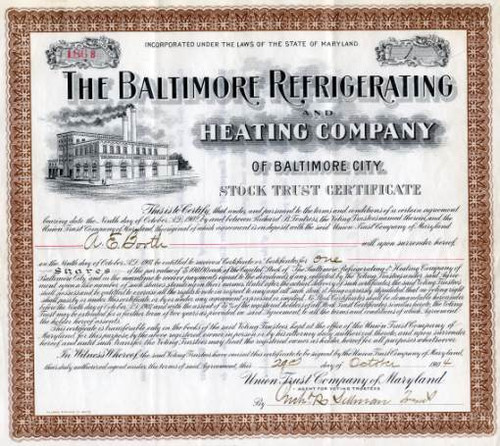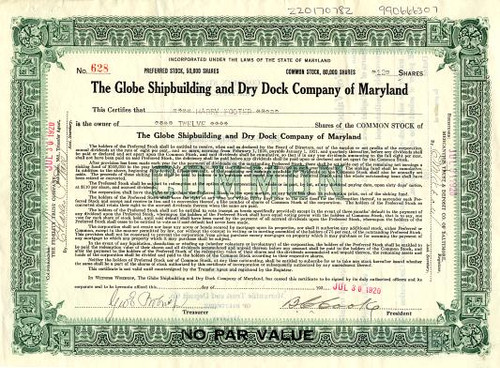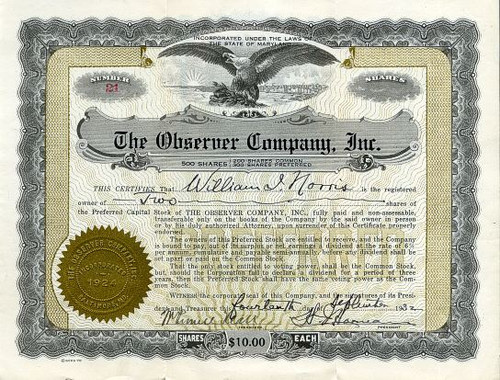Beautiful certificate from the The Roxbury Distilling Company. This historic document was printed by the A. Hoen & Company and has an ornate border around it with a vignette of the Company's logo. This item has the signatures of the Company's President,George T. Gambrlll and Treasurer, Thomas Lelshear and is over 103 years old. 
Certificate Vignette The Roxbury Distilling Company engaged in the manufacture, storage, and sale of whisky. They had an office in Baltimore, Maryland. The company's president, George T. Gamhrlll, was convicted for false pretense, and he appealed. Judgment reversed, and new trial awarded. See below: Argued before BOTD, 0. J., and BRISCOE, BURKE, THOMAS, PATTISON, URNER, STOCKBRIDGE, and CONSTABLE, JJ. Clifton S. Brown and George Whltelock, both of Baltimore, for appellant. Roland li. Marchant and Edgar Allan Poe, both of Baltimore, for the State. TURNER, J. The appellant was tried and convicted In the criminal court of Baltimore city upon an Indictment charging him with having obtained by a false pretense, which he well knew to be false, $5,000 current money from a certain George Schilling with Intent to defraud. In the bill of particulars It was stated In effect that on and prior to the 10th day of February, 1908, there was a corporation by the name of the Roxbury Distilling Company engaged In the manufacture, stor.age, and sale of whisky and having an office In the city of Baltimore ; that the defendant, George T. Gambrlll, was the president of the corporation and Thomas Lelshear was Its treasurer; that the company had previously Issued a warehouse receipt dated October 14, 1907, numbered 224, for 313 barrels of Roxbury rye whisky, serial Nos. 52734 to 53046, Inclusive, containing 15,180.5 gallons, and the receipt had been delivered to the Merchants' National Bank of Baltimore as collateral security for a loan made by the bank to the company; that on or about the 10th day of February, 1908, the defendant, designing and Intending to obtain from one George Schilling $5,000 In current money by means of false pretenses and with the Intention to defraud, directed Thomas Lelshear, the treasurer of the company, to endeavor to negotiate a loan of $5,000 with Schilling upon a note of the Roxbury Distilling Company to be secured by a warehouse receipt or certificate for 313 barrels, of whisky belonging to the company and stored In one of Its warehouses and being serial Nos. 52734 to 53040, Inclusive; that in pursuance of this direction the treasurer of the company, having no knowledge that the barrels of whisky so designated had already been pledged to the Merchants' National Bank, negotiated a loan to be made by George Schilling upon the proposed security, which was represented to be ample for the purpose; that thereupon the defendant, well knowing that this whisky was already pledged for an existing loan, and without baring the outstanding receipt therefor returned and canceled, and designing and Intending to cheat and defraud the prospective lender, unlawfully and willfully signed and caused to be issued a warehouse receipt of the Roxbury Distilling Company, dated February 10, 1908, numbered 238, for 313 barrels of rye whisky, serial Nos. 52734 to 53046, containing 15,180.5 gallons, being the same 313 barrels of whisky then pledged to the Merchants' National Bank of Baltimore, and also signed as president of the company a promissory note, bearing the same date, for the sum of $5,000, due four months after date, drawn to the order of George Schilling, and delivered the note and receipt to the treasurer of the company and required him to deliver them to the payee of the note or his agents; and that the treasurer, being without knowledge of the fraudulent and false pretenses recited, delivered the note and the warehouse receipt as collateral security to an agent of the lender and received his check, dated February 8, 1908, and payable to the order of the Roxbury Distilling Company, for $4,796.67, being the amount of the loan less discount, and which check was delivered by the treasurer to the defendant and the company and was In due course of business converted into cash. The bill of particulars also recited the provisions of section â of article 14 and section 119 of article 27 of the Code of Public General Laws of 1888 as being in force at the time of the offense charged and as prohibiting the issuance of any warehouse receipt for goods covered by an outstanding receipt until the first issued receipt was returned and canceled or destroyed. There are 19 bills of exception In the record. The questions they present relate to the admissibillty of evidence, and in order that they may be properly considered it will be necessary to define the controverted issue of fact to which the proof was directed. It was undisputed in the case that the warehouse receipt alleged to be fraudulent was actually issued as collateral security for the loan made by Mr. Schilling, and that the whisky represented by the serial numbers contained in the receipt bad been In fact previously pledged for an existing indebtedness. There was no contention that the defendant conducted the negotiation in connection with which the receipt was executed and delivered or that be received any part of the money thus obtained. The state's own evidence shows that Mr. Leishear, the treasurer, procured the loan and that the proceeds were deposited in bank to the company's credit. The receipt was prepared by Mr. Codd, one of the clerks in the employ of the company, and was signed by both the president and treasurer. The promissory note for which the receipt was to serve as collateral security was executed in the same way, and both instruments were delivered to the lender by Mr. Leisheur, who testified that he was unaware that the whisky designated in the receipt was already hypothecated. It was testified by Mr. Codd that he Inserted the serial numbers by order of the defendant. This statement does not appear to be contradicted by Mr. Gambrlll except in so far as it imputes to him knowledge as to the duplication of the numbers. He testified that he never made up or filled out warehouse receipts, but he does not deny that he gave directions to Mr. Codd as to their preparation. He disclaims, however, any knowledge of duplications except In two instances which were brought to bis attention by Mr. Codd and Mr. Leishear, respectively, and which do not affect the present inquiry. It appears, therefore, that the real Issue in the case was whether the defendant knowingly and with Intent to defraud, as charged In the indictment, directed, in the particular transaction described, the use of serial numbers which were Included, In an outstanding receipt. The misrepresentation Involved In the duplication having in fact occurred, the only question to be determined was whether the defendant's participation in it was the result of inadvertence or of a deliberate purpose to practice a false pretense. In the light of the issue thus defined, the various exceptions will now be considered. [1] The first exception was taken to the admission of testimony by Mr. Leishear to the effect that In October, 1908, he had reported to Mr. Gambrill the proposal of a certain bank to lend the company a considerable sum of money on distillery warehouse receipts provided they were certified, and that Mr. Gambrill had declined to certify the receipts on the ground that, if he did this for one bank, he would have to do it for all. This evidence was offered on the theory that the defendant's refusal to furnish the proposed assurance as to the validity of the receipts indicated a guilty knowledge on his part as to the falsity of some of those already issued. There is no proof as to how the certification of a warehouse receipt would be accomplished or how it would add to the security of the holder, and the proposal reported to Mr. Gambrill was made eight months after the duplication on account of which he is indicted. But there was proof as to other duplications during a period which Included the time of the proposal referred to, and the effort of the state was to show general guilty knowledge on the part of the defendant as to such occurrences with a view to proving criminal intent in the specific instance stated in the bill of particulars. This was in accordance with the rule stated in Carnell v. State, 85 Md. 1, 36 AU. 117. The point of the defendant's objection to the special certification proposed was not that it would be Impracticable or ineffective but that it would be inconvenient, and we do not think the evidence excepted to was so devoid of probative force as to render Its admission erroneous. [2] In proving other rehypothecations with which the defendant was sought to be connected, the state Introduced evidence as to the duplication of serial numbers which were included In a receipt issued and outstanding as collateral security for a promissory note which had been signed for the company by its vice president The defendant objected to this proof on the ground that he had nothing to do with the execution of the note. This objection was raised in the overruled. There was evidence tending to show that the defendant directed the insertion of the serial numbers In the receipt upon which the loan was obtained, and the fact that the note was executed by a different officer was entirely immaterial. [3] The third exception is unimportant Mr. Leishear, who was secretary as well as treasurer of the company, was asked to locate in the minute book the record of a meeting at which a motion to have the books of the company audited was passed. He answered that it occurred in October, 1908. The evidence to which the exception was confined does not disclose what resulted from the adoption of the proposal to audit the books or what was the position of the defendant on that subject The question was merely preliminary to a further inquiry as to which no objection was interposed, and we see no error in the ruling reviewed on this exception. [4] The fourth, fifth, and seventh exceptions refer to the refusal of the trial court to admit in evidence a checkbook of the company containing a number of checks signed in blank by the appellant as president and to allow questions to be asked as to the number of blank warehouse receipts which he had similarly signed and left in the company's office. It was the obvious purpose of these offers to show that the defendant did not maintain a close supervision over the details of the transactions In which the checks and receipts were customarily used. The precise facts, however, to which these exceptions relate were established without contradiction by other evidence, as to which there was no objection, and the exclusion of the offered proof, if erroneous, was not injurious and reversible. [5] By the sixth bill of exception it appears that Air. Leishear, the treasurer, who had testified in chief for the state, was asked on cross-examination as to his account with the company. It was stated to be the object of this inquiry to show the relation of the witness to the company and to prove certain entries made by him in his account on its ledger which might reflect on his credibility. The account was submitted to the inspection of the trial court but is not Included In the record. We have therefore no means of passing upon its admissibility. [6, 7] The eighth, ninth, tenth, twelfth, thirteenth, and fifteenth exceptions were reserved to the refusal of the court below to admit testimony as to the number of barrels of whisky the company had in storage at the · time of the alleged false pretense, and as to Its financial condition at that period, and as to the difficulty of ascertaining from its books whether warehouse receipts were duplicated. It was proposed to elicit this Information from an expert accountant who was called as a witness for the defendant PreviousContinue

Certificate Vignette








